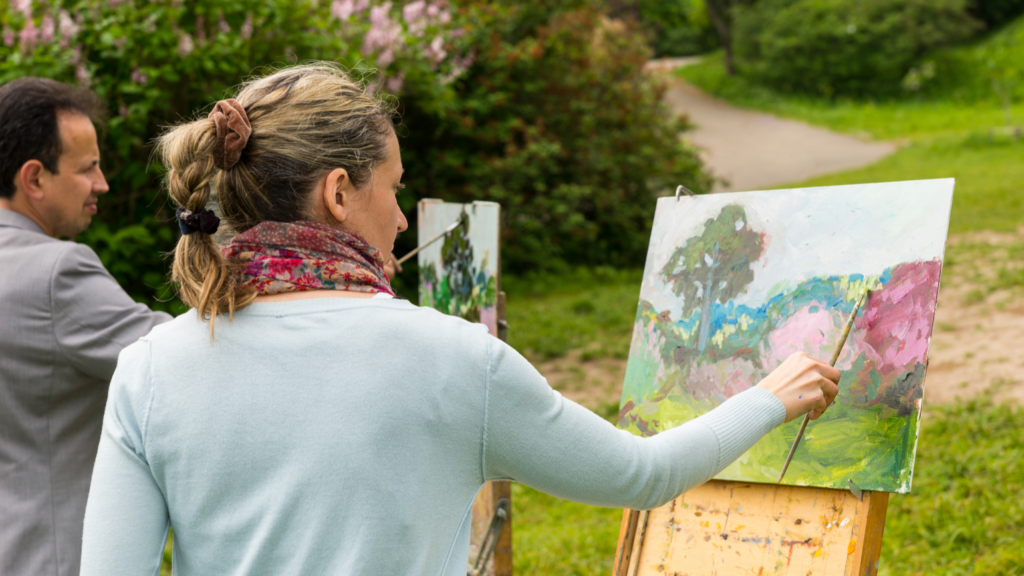“Creativity is like crabgrass,” writes Julia Cameron in her bestselling book The Artist’s Way, “it springs back with the simplest bit of care.”
As a writer whose livelihood depends on imaginative prose, I know all too well the blocks to creativity. It’s tempting to put down the pen when I have nothing to say. However, when I persevere through the blocks and continue to express myself despite my self-consciousness, my art becomes a holy act and a spiritual discipline that connects me more deeply to God, to my readers and to others.
Here are some ways to spark your creativity.
1. Empty your cup
According to a Zen proverb, a scholar with many ideas and opinions came to visit a Zen master for advice. The master poured his guest a cup of tea and kept pouring until the cup overflowed. “Stop pouring!” The man said, “the cup is already full.” “You are like this cup,” the master said, “come back when you have an empty cup.”
The laws of physics are such that we can’t fill any space – a tea cup or the right brain lobe, where creativity happens – if it’s already crowded. Dry periods, especially those that are unintentional, often precede imaginative spurts. Creativity is nurtured in spaces of emptiness, when our brains can file memories so that those experiences can be accessed when we’re ready. Even emptying a little of your cup—driving home in silence instead of listening to music—can go a long way to sparking creativity.
2. Get out of the way
In the 2000 movie “The Legend of Bagger Vance,” the mysterious Bagger Vance (played by Will Smith) advises a young golfer on how to get his swing back. He says, “Inside each and every one of us is our one, true authentic swing. Something we was born with. Something that’s ours and ours alone. Something that can’t be learned… something that’s got to be remembered…. All we got to do is get ourselves out of its way, to let it choose us.”
When we make creativity about us, we get tripped up, judging our talents by arbitrary measurements, like popularity or a spot in an art exhibit. Our challenge is to move past our egos so that we can dance to the rhythm of our inner song.
3. Focus on the why
Recently I presented a concept for a multimedia project to an audiovisual expert. To my surprise, he didn’t comment on my detailed outline. Instead, he urged me to catch a glimpse of the forest through the trees. “You’re too focused on the how rather than the why,” he told me. This meant going back to a blank page and thinking more deeply about my mission. It meant setting aside my agenda and allowing for the unexpected to happen. In focusing on the “how” of a creative project—a deadline, the intended audience, the bottom line—we can lose our voice and get distracted from our higher purpose. Strategy is important, but we create more meaningful work when we free ourselves to trust the process.
4. Let go of perfect
Nothing stymies creativity like perfectionism. When your attempt to paint, write or compose a perfect masterpiece handcuffs your efforts to create, remember Kintsugi, the Japanese art of fixing broken pottery with gold. By accentuating the fractures in a piece as opposed to covering them up, the pottery becomes even more valuable than its flawless original. When I write and speak, I try to live by the words of Leonard Cohen in his song, “The Anthem”: “Ring the bells that still can ring, forget your perfect offering, there’s a crack, a crack in everything, that’s how the light gets in.”
5. Identify your fears
For many years my fears unconsciously blocked my efforts to create. I abandoned my more personal writing and concentrated on reported stories that were safer to publish. A year ago, I got serious about pinpointing what was blocking me from pursuing my heart’s desire to share more intimate parts of my journey with readers. I realized I was scared of re-experiencing the feelings of rejection that were so painful early in my development. My task, then, was to comfort the scared little girl inside me—through journaling, art therapy and meditation practices—in order to develop the confidence and self-assuredness needed to share my story. Ask yourself these questions: What fear is blocking your creativity? What do you need to do to overcome it?
6. Show up
When I was training for a marathon, my running coach had just one piece of advice: show up. If I showed up for practice and ran with him five miles a day, adding distance on the weekends leading up to the marathon, I would complete the 26.2 miles on race day. Anne Lamott says something similar in her book Bird by Bird: Begin with the first draft, no matter how awkward it is. “Almost all good writing begins with terrible first efforts,” she writes. “You need to start somewhere. Start by getting something—anything—down on paper. A friend of mine says that the first draft is the down draft—you just get it down. The second draft is the up draft—you fix it up.” Even if all you write today is two grammatically incorrect sentences, that effort will promote better writing tomorrow.
7. Team up
The Girl Scouts designed the Buddy System for a reason. We often need a helping hand to guide us out the woods and read a compass correctly. Connecting with a kindred, creative soul can stimulate our imaginations, boost our confidence and give us the support we need to be vulnerable and express ourselves.
In his book The Power of Two, Joshua Shenk explains how the synergy of a pair is much greater than the sum of two parts. He studied several famous creative pairs: The Beatles’ John Lennon and Paul McCartney, Marie and Pierre Curie, who discovered radioactivity, civil rights leaders Ralph David Abernathy and Martin Luther King and comedians Larry David and Jerry Seinfeld. “The pair is the primary creative unit,” he writes. “Two people can do things together that are better, bolder and more enduring than what they do alone.”
“Creativity is an act of faith,” writes Cameron. In working to cultivate our own creativity, we open ourselves up to a more powerful relationship with our Creator.




